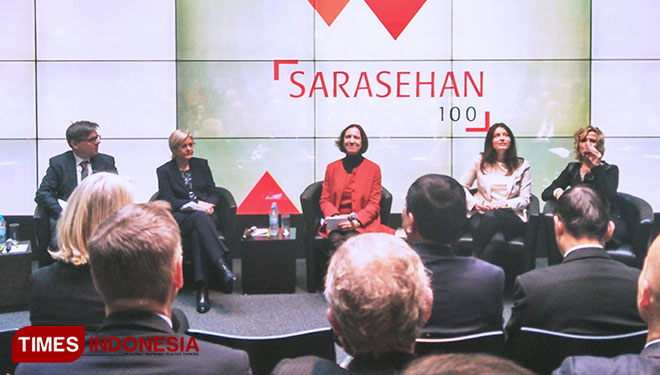Indonesia-Germany: A Friendship Story since the 19th Century

TIMESINDONESIA, JAKARTATHE FRIENDSHIP BETWEEN INDONESIA AND GERMANY HAS BEEN GOING ON SINCE THE BEGINNING OF THE 19TH CENTURY. AT THAT TIME, SOME GERMAN PUBLIC FIGURES, SUCH AS ADOLF BASTIAN, LUDWIG INGMER NOMMENSEN AND CASPAR GEORG CARL REINWARDT INITIATED THE CONSTRUC – The friendship between Indonesia and Germany has been going on since the beginning of the 19th century.
At that time, some German public figures, such as Adolf Bastian, Ludwig Ingmer Nommensen and Caspar Georg Carl Reinwardt initiated the construction of Kebun Raya Bogor in West Java.
Advertisement
Meanwhile, there were some public figures from Indonesia, such as Raden Saleh, Bung Hatta, and B. J. Habibie, who used to study and live in Germany.
In the history, the name “Indonesia” was derived from Greek, which means “India Islands”. This name was chosen by Indonesian youths when they were struggling for independence.
This name was given by a German research, whose name was Adolf Bastian (1826-1905).
From his visitations to Indonesia in 1861 to 1898, he published five copies of his book of which title is “Bangsa-bangsa di Sebelah Timur Asia”. In one of those copies, he popularized the name of ‘”Indonesia” for the first time in Germany.
There were other German scientists and artists who put their interest on Indonesia. A geographer named Franz Wilhelm Junghuhn spent most of his lifetime to study the geography and the geology of Indonesia. A German artist named Walter Spies (1895-1942) used to stay in Bali Island, and his artworks had given many influences towards the local arts.
Meanwhile, one of the famous Indonesian artist, Raden Saleh (1811-1880), spent some of his time in Germany. Raden Saleh’s artworks had also influenced the local arts in Germany. There was no other Asian artists that had a special relation with the European modern art at that time.
In a letter addressed to Herzog Ernst II from Sachsen, Coburg, and Gotha, he wrote, “I came to Europe as a Javanese, and I got back to Java as a person who has German characteristic.”
Another Indonesian figure is the third Indonesian President, B. J. Habibie. He studied and spent most of his lifetime in Germany.
Until now, the bilateral relation between Indonesia and German has developed in many aspects. This is marked with the strong friendship and partnership between Indonesia and Germany.
The bilateral relation between the two countries was strengthen by the agreement, which is called Deklarasi Jakarta in 2012.
This agreement became the foundation for the two countries to have a strong, multidimensional partnership. In 2016, the head of the government reaffirmed their commitment for the partnership, which is written on Deklarasi Jakarta.
“Currently, Germany is Indonesia’s third biggest partner of bilateral cooperation after Japan and United States,” stated Arif Havas Oegroseno, the Indonesian Embassy for German Federal Republic, in the event of The 100th Workshop. This event was held on 31 January 2019 in Brandenburger Tor Museum, Berlin, Germany.
The Indonesian Embassy Berlin made a commitment to focus and discuss about the issues in this bilateral relation in this workshop. This workshop was aimed to strengthen the bilateral cooperation and consider the second position of the country as a Non-Permanent Member of the Security Council of the United Nations in 2019-2020.
This workshop was held for the first time by Indonesian Embassy Berlin on 26 October 2008. Since then, there were 104 speakers, such as scientists, artists, organization representatives, or governmental and non-governmental agencies from German and Indonesia, or other countries, were invited to this event.
In this 100th Workshop, the senior representatives from the ministry and the governmental organizations were asked to discuss on the main topics of bilateral relation between Germany and Indonesia, namely: the security and counterterrorism, economy/trading and development cooperation, and education and science.
The speakers were the Germany Ambassador, Ina Lepel (Directorate-General for Asia and the Pacific), Dr. Oliver Bange (Federal Ministry of Defense), Martin Grönert (Federal Intelligence Service), Heidrun Tempel (The Commissioner for Dialogue between Cultures at the German foreign office), Jutta Kranz-Plote (Federal Ministry for Economic Cooperation and Development), Sabrina Netzer (The Chairman of DIHK), and Michael Hörig (German Academic Exchange Service (DAAD)).
The representative from Indonesia was the Head of BNPT, Komjen Pol. Drs. Suhardi Alius, M.H.
In his presentation, Suhardi explained about the government’s effort to eradicate terrorism.
His presentation was entitled “Indonesia’s Effort in Preventing and Countering Terrorism at the National and Regional Level”.
The purpose of this event was to build the foundation for the future partnership and collaboration, as well as to improve the benefits for the two countries.
From this workshop, the guideline for mid and short-term cooperation between Germany and Indonesia is expected to be implemented. (*)
**) Ikuti berita terbaru TIMES Indonesia di Google News klik link ini dan jangan lupa di follow.
| Publisher | : Rizal Dani |

